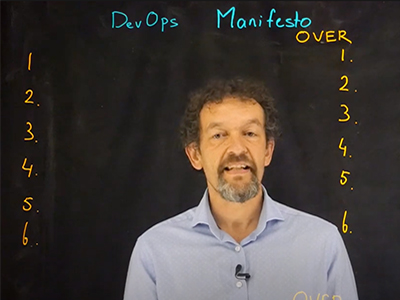How DevOps consultants can help manage the transition to DevOps
Solnet's proud to be sponsoring DevOpsDays Auckland, 3-4 October 2017. We're excited to share our learnings with the DevOps community, and to meet businesses learning about DevOps.
To understand more about DevOps we're talking with Mat Degerholm, our Enterprise Platforms Manager.
Hi Mat, firstly let’s start with the DevOps Days event. What is DevOps, and why is Solnet sponsoring the event?
For me DevOps is more than just 'extending agile to the infrastructure' – I view it as being quite simply a better way to work. DevOps offers the opportunity to truly transform traditional delivery and operations approaches, by uniting teams toward a common goal of building and delivering high value software rapidly.
We're sponsoring this industry event as we're passionate about the subject and keen to share our experiences, but also keen to hear what others are up to in this space. If you’re heading along to DevOpsDays in Auckland this October, keep a look out for us!
Why should organisations consider DevOps in their approach to delivering products and services?
To remain competitive today's digital enterprise needs to be able to deliver new features to the market faster, but also more reliably and efficiently. DevOps enables organisations to address these challenges.
What are some of the advantages and business benefits of moving to DevOps?
While breaking down traditional silos can not only speed up the time taken to go from 'ideation to production', it can also vastly improve release quality and problem resolution time. However one of the other groups of benefits that's often overlooked is the possibility for transformation in terms of an enterprise's culture, productivity and employee satisfaction.
How successful have New Zealand organisations been in implementing DevOps – are we ahead or behind of what’s happening internationally?
I'd say in many ways that NZ is still behind the curve, and while there can be benefits from not being an 'early adopter', I believe the market has reached critical mass now – meaning if you’re not already thinking about your DevOps strategy, you probably should be.
What are some of the challenges of implementing DevOps?
A common hurdle on the DevOps journey is diving straight into trying to solve the problem with technology. Yes, you'll need to consider your DevOps toolchain, Continuous Delivery methodologies etc, but in the case of DevOps it's important to start with the people. We've found it useful to nominate a "DevOps champion" - someone who’s empowered to work with business stakeholders to champion the cause, and also work with IT teams to provide the necessary guidance and reassurance.
It’s also important to take time to map out your organisation’s “value chain” – and in particular those places where your existing processes reduce or destroy that value along the chain.
What is Solnet’s approach and method of helping New Zealand businesses realise the opportunities of DevOps?
We partner with our customers to assist them on their DevOps journey. We offer a range of services, starting with DevOps and Continuous Delivery consulting to help you shape your strategy and approach, through to DevOps-related delivery services, including DevOps toolchain design and CI/CD pipeline implementation.
Is DevOps just for large enterprises?
DevOps isn't just for the large enterprise. However there are certain pre-conditions that do need to be met for DevOps to make sense, for example having a reasonably mature Agile development methodology. Not to mention the need for organisational commitment – DevOps isn’t something you can do by stealth in a large enterprise.
What are some of the supporting technologies that are needed to move to DevOps successfully?
DevOps is less about specific technologies and more about approaches. You’ll need to be thinking about how you implement a Continuous Delivery pipeline for software releases, and how you automate your infrastructure – typically referred to as infrastructure-as-code.
However since you’ve asked about supporting tech: we typically use Git for source code management, Jenkins for build, deploy and automated test jobs and Nexus as the artefact repository. For application hosting we prefer OpenShift, which is an enterprise-ready container platform, offering development teams the ability to perform self-service application deployments without needing to involve infrastructure teams.
How can a business get started on the DevOps journey simply and easily?
If you're considering DevOps but not sure where to start, chances are you don't yet have a good picture of the actual cost to your business of your current way of working. Our "time to value analysis" is a lightweight engagement aimed at helping you quantify the time taken for the journey from ideation to production, and to help put a figure to the true cost to your business. Being armed with this information can help secure the required funding and business buy-in.
Is DevOps a “service” that Solnet provides or is it more of a way of working?
Strictly speaking, you don't "do" DevOps. Having said that however, we're in the process of readying our own "DevOps-as-a-service" offering: essentially a managed digital application platform for the cloud, with release pipelines and toolchain services, supported by skilled engineers, all delivered as a service. If you're currently considering your own Docker/Kubernetes/Jenkins approach, you may want to speak to us first.


